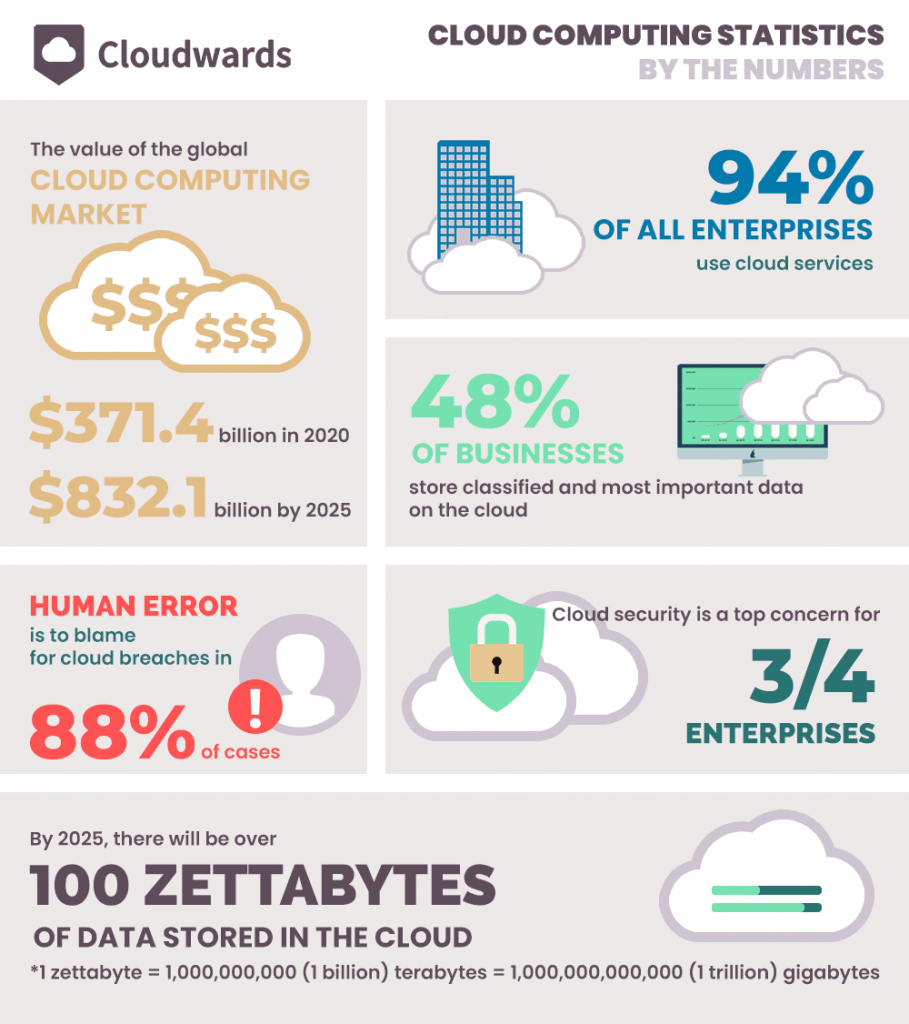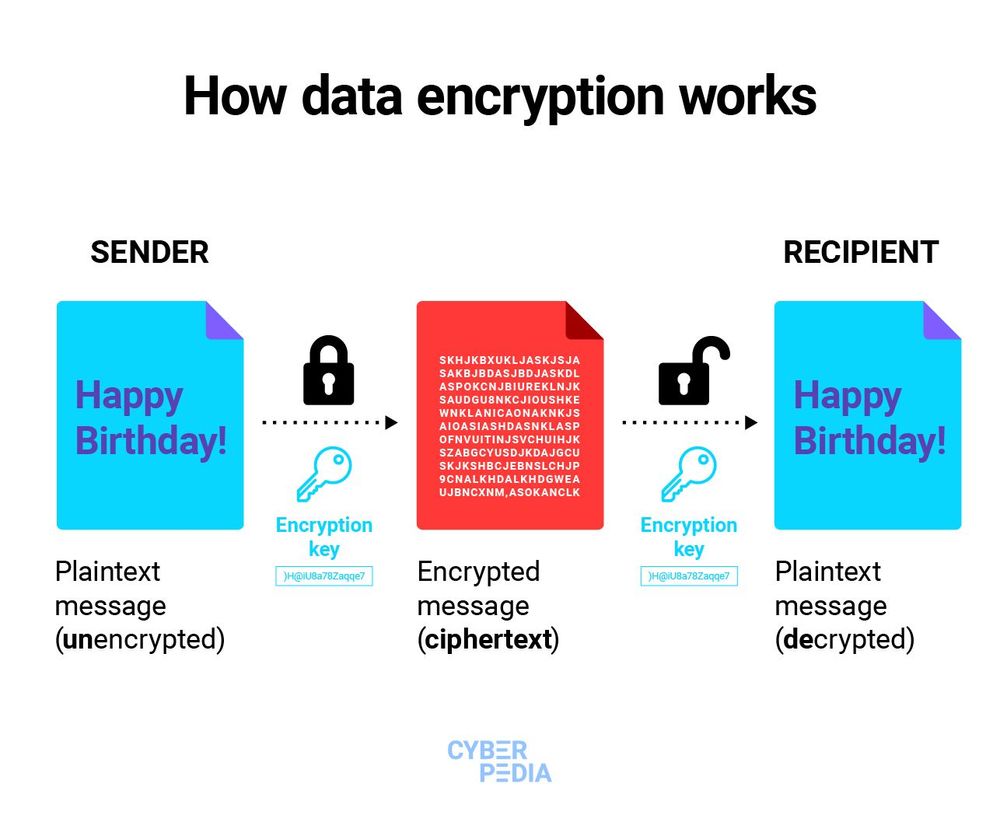Choosing the best cloud storage provider for your business is one of the most crucial decisions a business can make. Cloud storage will increase your company’s productivity, and collaboration to improve workflows within departments will help maintain the confidentiality of employee and customer records.
Despite the wealth of cloud storage providers currently on the market, some offer different services. Some focus on privacy, whereas others rely more on collaboration features to integrate with other products.
To help facilitate this decision-making progress, we will offer key insights on what businesses, big or small, should consider when choosing cloud storage to help manage business needs.

Why cloud storage is essential for businesses
From 2015 – 2022, the data stored in the cloud doubled from 30% to 60%. Unfortunately, the amount of sensitive data stored in the cloud makes it vulnerable to hackers. As a result, choosing a cloud storage provider requires a thorough understanding of how they protect your data, as a data breach or leak could cost a business:
- Financial loss: legal expenses can accumulate from fines, loss of earnings, or lawsuits by individuals affected by data breaches.
- Reputation damage: by customers, partners, and stakeholders or even negative media coverage.
- Legal consequences: either from individuals affected or from regulatory authorities.
Cloud storage, therefore, is an essential method for businesses to protect data. The best cloud providers implement powerful technology and follow strict privacy laws to protect confidential and sensitive data.
However, each cloud storage has different methodologies when you upload and store files in the cloud, so we will look at what things you should consider when choosing which cloud storage is right for your business.

Source: cloudwards.net
What to consider when choosing cloud storage for your business
Like any business decision, cloud storage is an important investment for the company’s future, so no matter how big or small, young or old your company is, choosing cloud storage will become a crucial part of the way the company runs.
Here is a list of the recommended areas to research and be aware of to help your company and your team decide to secure essential data.
Privacy laws
Each country’s privacy laws will differ depending on where your business headquarters are. The same applies for cloud storage. Popular cloud storage providers, i.e., the big three, Google Drive, Microsoft OneDrive, and iCloud, all adhere to US privacy laws, specifically the California Consumer Privacy Act or CCPA.
European and Swiss Privacy laws are known for their stricter privacy policies and how they handle consumer or sensitive data. Cloud companies that follow the General Data Protection Regulation (GDPR) ensure businesses follow strict privacy measures when handling sensitive data, whether the business is in the EU or not.
The benefits of businesses using cloud storage that follow European or Swiss laws, therefore, involve:
- Ensure businesses are accountable in their data processing.
- Monitor how businesses process and protect personal data.
- Give data subjects the right to access, erase, or restrict the process of personal data.
A business should, therefore, become familiar with these privacy laws for their data practices and when choosing a cloud storage for their business. For example, selecting a cloud storage provider that follows the GDPR helps develop trust in the business brand and ensures that the cloud provider and business handle data responsibly.
Advantages and disadvantages of cloud computing
When considering cloud storage options for your business, it’s essential to weigh the advantages and disadvantages of cloud computing. Cloud computing offers scalability, cost-effectiveness, and accessibility, but it also comes with potential security concerns and dependence on internet connectivity. Evaluating these aspects will help you make an informed decision for your business needs.
Scalability
Determining the amount of data you need to store will depend on the size of your company, but also the predictions of how fast and how quickly you expect the business to grow in the future.
Scalability will require knowledge of assessing the volume of data generated, the types of data, and the needs of how a business has to access, retrieve, and process this data.
Through time, business data may grow or shrink for various reasons. As a result, a cloud storage solution for a small to medium business will be helpful and will help meet these demands due to the flexible payment, storage, or business plans may provide.
For larger enterprises, cloud providers offer custom business plans on a per-month per-user basis. So, if your company has the budget and needs to store and manage vast data, this is another valuable option.
Budget Pricing & cost structure
Similarly to scalability, the bigger the cloud storage, the bigger the cost you will have to consider for your company’s budget. You may invest in a one-time payment with a cloud storage provider that offers lifetime plans, for example, freeing up your budget for the future if you know exactly how much storage you need for a particular purpose.
If not, other options are to adjust your storage plan based on the company’s needs or invest in a more expensive plan upfront, which may be more cost-effective as the needs and demands of the business grow.
Collaboration & sharing features
Businesses can also utilize cloud storage in their workflows to work on projects, meetings, or share reports. Popular services like Office 365 or Google’s suite of products allow for real-time collaboration on projects for numerous people to work on a document in real-time.
Collaboration is a valuable tool in cloud storage for businesses working remotely or in different locations, as it reduces delays, encourages teamwork, and reduces errors.
Secure sharing of documents is also crucial for businesses to reduce data leaks, breaches, or network attacks. A business should choose a cloud provider to share sensitive information, choose options that encrypt files and folders, limit access, and password-protect files.
Management & accessibility control
Management controls will avoid data getting into the wrong hands or sensitive information being shared within the wrong departments of a business. Access management measures are in place to determine who has access to what data and for how long.
Different cloud storage will offer different access management controls. Still, a business should prioritize secure sending options, such as password protection, restricting access to authorized emails, or making files viewable only and unavailable to download.
Choosing how sensitive files can be accessed is also important to consider to stop unauthorized parties from viewing confidential information. Access controls are an important measure for businesses to show compliance with privacy laws and show that businesses handle data responsibly.
Encryption
Encryption changes a plain text file (readable) into ciphertext (unreadable). It uses a set of keys to encrypt and decrypt the file; files can only be converted back to its readable form with the correct decryption key.
Laws require that cloud businesses encrypt data, as it is crucial to protect data when files are transmitted. Businesses should choose a cloud provider that encrypts files at rest (when stored in the cloud) and in transit (when sent).

Source: bitdefender.com
Companies that value the privacy of files will also implement zero-knowledge policies, meaning the company can never decrypt and view your files; only the owner of the cloud account can.
Other companies differ in this approach; Google and Microsoft, for example, own the decryption keys to data, meaning they can theoretically view your business’s sensitive information–from corporate strategic plans to the executive’s net worth tracker data–or pass it over to agencies if they require it.
Backup and file recovery
Finally, businesses need to protect data at all costs or risk losing vital data that will harm the company, its employees, and its customers. Fortunately, most cloud providers allow for regular backups of files that a business can customize to ensure the most recent versions are always available to avoid huge data loss.
Another crucial method to consider is file recovery. Consider how your cloud provider stores data on its servers. To protect files against data loss, the cloud can use redundancy of files to protect business data. The same file is stored in different servers in different locations, drastically reducing the chances of data loss but making file recovery much easier.
Conclusion
While there are many things to consider when choosing cloud storage for business, choosing a company that is transparent about its data handling practices can make the process easier.
Considering the points outlined in this article, your business can invest in data security and help its employees and customers feel more secure when they trust you to store sensitive or confidential documents.























Leave a comment!